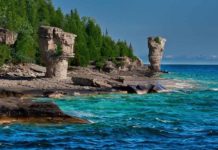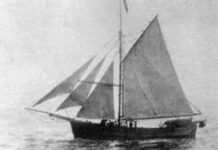Scarlet fever struck Joseph Tyrrell when he was a young child and the illness left him with permanent hearing damage. Tyrrell, born on November 1, 1858 in Weston, Ontario, was a boy with great strength of character. He completed studies at Upper Canada College then graduated from the University of Toronto in 1880. Holding a fresh degree in Law, Tyrrell joined a local law firm and studied for admission to the Bar. But a career in the legal arena was not in Tyrrell’s future.
Poor health caused Tyrrell to visit his doctor; the physician suggested work out of doors to ease Tyrrell’s ailments. “He now took a job as an assistant with the [Geological] Survey [of Canada], and in 1883 was invited to accompany a GSC survey to help determine the CPR’s route west…,” said The Alberta Freemason in “Bro Joseph Burr Tyrrell’, February 2009 issue. One of his first tasks was to catalog rocks and fossils found by GSC geologists on earlier trips. The next year, Tyrrell lead his own team on a search for natural resources in the Red Deer River valley. The expedition became one of the new geologist’s crowning glories – he was the first to find major dinosaur bones.
Tyrrell Discovered Dinosaur Bones and Coal Seams
Climbing a precipitous rock face in June 1883, 26-year-old Tyrrell was startled to come nearly face to face with the skull of a large dinosaur. Carefully cleaning away the dust and dirt, Tyrrell uncovered Albertosaurus Sarcophagus, the fossil remains of a slightly smaller relative of Tyrannosaurus Re. Although he was not a palaeontologist, Tyrrell was the first to find the Albertosaurus in Canada. The excitement was far from over for the geologist. A few days later, Tyrrell and his team discovered one of the largest seams of coal deposits in Canada, leading to the coal mining industry in the Drumheller region.
Tyrrell continued surveys of Canada’s north, leading missions to map uncharted territory. It was hard work that took the men away from home for months at a time, “marked by bitterly cold temperatures and supported by a bare minimum of food supplies,” according to Encyclopedia of World Biography’s entry on Tyrrell. Occasionally out of contact for so long, they were thought to have died in the wilderness. “They traveled by canoe, dog sled and snowshoe” to complete their assigned duties, noted the Encyclopedia. Tyrrell often brought his brothers, Grattan and James, as his assistants.
“Pace Surveys” Measured Long Distances on Foot
One of the many surveying requirements was to do pace surveys, meaning “measuring by the foot the distance traveled,” noted “Trailblazer: Joseph Burr Tyrrell” at Natural Resources Canada. In 1892, Tyrrell and his team were assigned to map the region from Churchill to Lake Athabasca; eight months later, “the expedition covered 5,150 kilometres by canoe and on foot,” said Natural Resources Canada . Tyrrell’s journey “gathered the first accurate information on the region’s geography and geology.”
After a later survey, Tyrrell presented his convincing theories on glaciations and the prehistoric ice ages of northern Manitoba to the British Association for the Advancement of Science.
In 1894, Tyrrell married the daughter of a Baptist minister from Ottawa, Mary Edith Carey. Sharing her husband’s interest in geology and mining, in 1921 Mrs. Tyrrell founded and was the first president of the Women’s Association of the Mining Industry in Canada. Joseph and Mary Tyrrell raised three children: one daughter, Mary (1896), and two sons, George (1900) and Thomas (1906).
Geologist Left the GSC for Consulting in Klondike
While Tyrrell had made exceptional discoveries in the geology and palaeontology of Canada, he felt his work was unrecognized by the GSC. He was still receiving $1,800 a year, the lower wages of a clerk, rather than the higher earnings of a professional. Leaving the Survey, Tyrrell traveled to Dawson City in the Yukon in 1898. He observed how golden nuggets of wealth were found in the pans and sluices of determined miners. Since he was familiar with the geology of the region, Tyrrell set up his own successful business as a mining consultant.
Moving to Toronto in 1907, Tyrrell was a mining consultant during the gold, silver and cobalt rush in northern Ontario. “In 1924 he invested in the Kirkland Lake Gold Mine,” said The Alberta Freemason, “and was its general manager for some years and its president until 1955.” During those decades, Tyrrell also edited for publication the journals of David Thompson, a Canadian explorer in the 1700s, and compiled documents of the Hudson’s Bay Company.
Tyrrell’s Apple Orchards Later Became Toronto Zoo
Retiring to a farm he purchased in 1921, Tyrrell was still an entrepreneur. With his son George’s assistance, he operated a large and profitable apple orchard on property that is now the expansive Toronto Zoo. Joseph Burr Tyrrell died in Toronto on August 26, 1957, only a few months short of his 99th birthday. His wife died had twelve years earlier, in 1945.
In Tyrrell’s honour, the Royal Tyrrell Museum opened on September 25, 1985 in Drumheller, Alberta. As Canada’s palaeontology authority, the Museum is home to one of the world’s largest displays of dinosaurs and participates in ongoing education and research into fossil discovery.
A man of exceptional abilities, and even more remarkable considering his hearing challenges, Joseph Tyrrell earned a number of prestigious honours.
- 1896 The Royal Geological Society’s “Back Award”
- 1916 The “Murchison Medal” (for his glaciation finding
- 1930 Honourary Doctor of Laws, University of Toronto
- 1933 “Flavelle Gold Medal” from the Royal Society of Canada
- 1947 “Wollaston Medal” for lifetime achievement from the Royal Geographic Society of England
More Honours for Tyrrell
Mount Tyrrell in Banff National Park, dubbed in the mid-1880s by Tyrrell’s boss, geologist George Dawson, then head of the Geological Survey of Canada
J.B. Tyrrell Historical Medal, established in 1927 under the Royal Society of Canada, and funded initially by Tyrrell himself. The award is given every two years for “outstanding work in the history of Canada.”
J.B. Tyrrell Senior Public School opened in 1972 in Scarborough, Ontario
Sources:
- “Joseph Burr Tyrrell”, Encyclopedia of World Biography
- “Bro Joseph burr Tyrrell”, The Alberta Freemason, February 2009 issue
- “Trailblazer: Joseph Burr Tyrrell, 1858-1957”, Natural Resources Canada
- “Life of a Rock Star: Joseph B. Tyrrell”, Library and Archives Canada, Collections Canada







